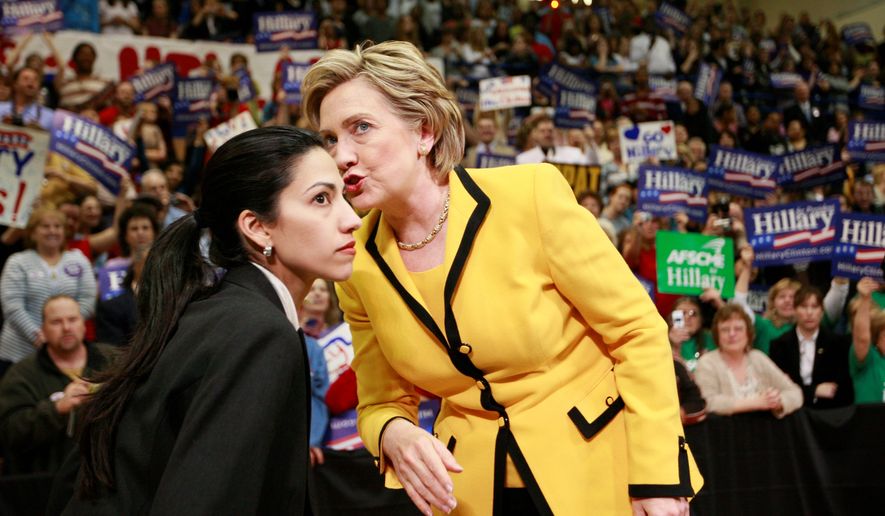Former Secretary of State Hillary Clinton began planning use of her secret email address even before she took office in January 2009, top aide Huma Abedin said in sworn testimony this week, raising questions about why no emails from her first few months in office were part of the set she returned to the government.
Ms. Abedin said “technical difficulties” forced Mrs. Clinton to give up the AT&T account she used as a senator, but said her boss’ choice to use her own personal BlackBerry connected to a server she kept at her home in New York was based on convenience, not an effort to thwart open records laws.
Ms. Abedin, who was a deputy chief of staff for Mrs. Clinton at the State Department, testified for several hours, detailing her own use of an account on Mrs. Clinton’s secret server and her subsequent efforts to get right with laws requiring all official business to be stored in department records.
“I assumed it was OK to use it. I wasn’t told that I couldn’t use it,” Ms. Abedin said under questioning from Judicial Watch, a conservative law firm that has been pursuing several cases over the Clinton emails. The deposition took place Tuesday, and Judicial Watch released a transcript Wednesday.
She said she asked former President Clinton’s tech staffer for a personal account at the end of Mrs. Clinton’s presidential campaign, when both her campaign and Senate email addresses were disappearing. The staffer, Justin Cooper, said he was already setting up an account for Mrs. Clinton and offered an email address to Ms. Abedin as well.
Ms. Abedin said she couldn’t recall being briefed on the Freedom of Information Act, either coming into office or when she left.
But she did say Mrs. Clinton’s use of her secret account caused problems — including Mrs. Clinton missing the chance to make a phone call to another country’s foreign minister because her messages didn’t go through.
“So she wasn’t able to do her job, do what she needed to do,” Ms. Abedin testified.
Ms. Abedin said she generally tried to use her State.gov account for official business, and resorted to her secret account when her official one was down.
That’s different from Mrs. Clinton, who rejected use of an official account and exclusively used her clintonemail.com account for government emails. She said it was a matter of convenience.
When Ms. Abedin’s use of the secret email account became public and the State Department demanded the messages be returned, Ms. Abedin said she turned her computers and BlackBerry device over to lawyers, gave them her login and password information, and left it up to them to decide which records should go back.
“I was not involved in the process,” she said.
That’s a break with the usual open records process, which would involve a government employee going through his or her own records to decide what should be considered public documents.
In Mrs. Clinton’s case, she said she returned about 32,000 emails to the government but didn’t turn over another 30,000 that she and her lawyers deemed personal.
Judicial Watch President Tom Fitton said it’s a problem to have someone who’s no longer in government service decide what is an official record, and it’s why the State Department should take control of Mrs. Clinton’s server.
“The government needs to go through these records,” he said.
• Stephen Dinan can be reached at sdinan@washingtontimes.com.




Please read our comment policy before commenting.